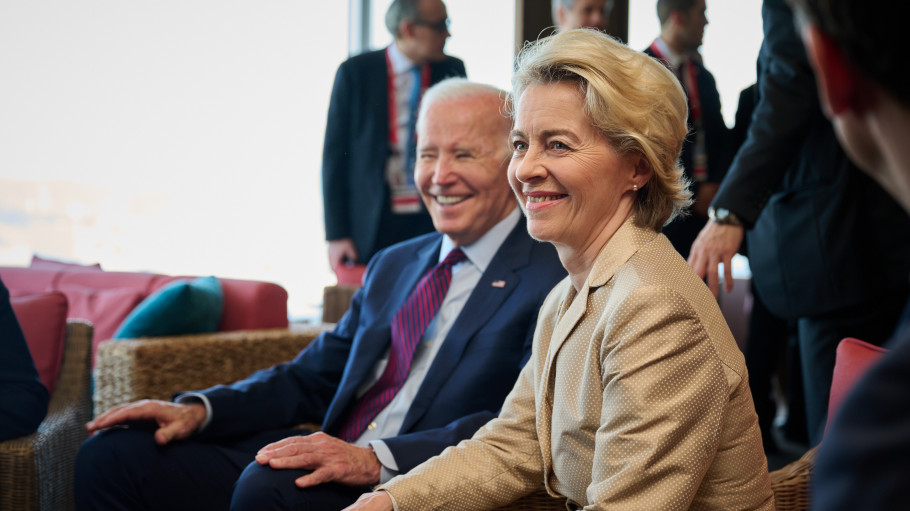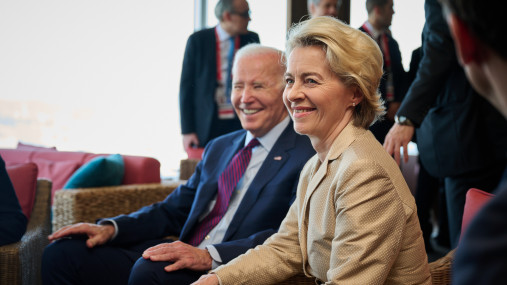
Press releases » EUROFER calls for robust EU-US Global Arrangement to address steel industry’s existential challenges
EUROFER calls for robust EU-US Global Arrangement to address steel industry’s existential challenges
Downloads and links
Recent updates

Brussels, 13 October 2023 – The EU-US Summit planned for 20 October in Washington should pave the way for a global solution to tackle the two existential challenges facing the steel industry worldwide: non-market excess capacity and carbon intensity. Only a strong, international binding agreement can adequately respond to a new global context where government-fuelled, carbon-intensive excess capacity has reached 600 million tonnes, urges the European Steel Association.
“We expect to have an interim agreement to be announced by Commission President Ursula von der Leyen and US President Joe Biden, outlining an ambitious framework that will provide clear guidance and include the substantive elements of the Global Arrangement on Sustainable Steel and Aluminium (GASSA). The details will need to be worked out in the coming months”, said Axel Eggert, Director General of the European Steel Association (EUROFER). “The GASSA should be an international agreement binding transatlantic partners with a common vision while also remaining open to other like-minded countries with closely aligned trade policies and measures. Individual actions taken in isolation cannot have a global impact on excess capacity and decarbonisation”, he added.
Recently, the OECD expressed grave concerns about the deterioration of the global steel market, where excess capacity has now surpassed 600 million tonnes - more than the total OECD steel capacity. This excess capacity is mainly found in Asia, the Middle East and North Africa. Furthermore, new non-market capacity expansions are primarily focused on very carbon-intensive, traditional coal-based furnaces. Another 150 million tonnes of steel capacity are set to become operational by 2026, while global steel demand is expected to remain weak. “This new capacity alone, locking-in CO2 emissions for decades, will result in more CO2 emissions than the entire EU steel industry combined, erasing all of the EU steel industry’s emission reduction efforts up to 2050 in just three years”, stressed Mr. Eggert.
Today, the global steel industry is responsible for over 10% of global CO2 emissions, to which EU steel production contributes only a fraction (6% of total global steel emissions). If the global steel industry and other large industrial emitters are not decarbonised by 2050, the UN climate target of staying below a 1.5 or even 2-degree Celsius increase will not be achieved.
“The GASSA is a unique - and perhaps the only - opportunity to reach substantial emission reductions in the global steel industry”, emphasised Mr. Eggert. “The EU steel industry is currently in the most vulnerable situation, having lost around 30 million tonnes of sales in the EU and foreign markets over the past decade. We need an effective GSSA to transition towards carbon neutrality and support the EU’s strategic autonomy objective in a sustainable manner. Traditional trade instruments are fit for purpose, but their purpose is not to address global non-market excess capacity, while the Carbon Border Adjustment Mechanism (CBMA) has still to prove its effectiveness to level the playing field”, he concluded.
Photo credits: European Union, 2023, EC - Audiovisual service
Contact
Lucia Sali, Spokesperson and Head of Communications, +32 2 738 79 35, (l.sali@eurofer.eu)
About the European Steel Association (EUROFER)
EUROFER AISBL is located in Brussels and was founded in 1976. It represents the entirety of steel production in the European Union. EUROFER members are steel companies and national steel federations throughout the EU. The major steel companies and national steel federation of Turkey and the United Kingdom are associate members.
The European Steel Association is recorded in the EU transparency register: 93038071152-83.
About the European steel industry
The European steel industry is a world leader in innovation and environmental sustainability. It has a turnover of around €130 billion and directly employs around 306,000 highly-skilled people, producing on average 152 million tonnes of steel per year. More than 500 steel production sites across 22 EU Member States provide direct and indirect employment to millions more European citizens. Closely integrated with Europe’s manufacturing and construction industries, steel is the backbone for development, growth and employment in Europe.
Steel is the most versatile industrial material in the world. The thousands of different grades and types of steel developed by the industry make the modern world possible. Steel is 100% recyclable and therefore is a fundamental part of the circular economy. As a basic engineering material, steel is also an essential factor in the development and deployment of innovative, CO2-mitigating technologies, improving resource efficiency and fostering sustainable development in Europe.

Brussels, 07 May 2024 – The European Commission has today published two Regulations extending the anti-dumping and countervailing measures in force on imports of stainless steel cold-rolled flat products (SSCR) originating in Indonesia to imports of SSCR from Taiwan, Turkey and Vietnam. EUROFER welcomes the extension of the duties and the introduction of import requirements connected to strict monitoring of imports.
The outlook for the European steel market in 2024 continues to lose momentum amidst persisting challenging conditions. Downside factors such as worsening geopolitical tensions, coupled with growing economic uncertainty, energy prices, inflation, interest rates have further impacted demand prospects. According to EUROFER’s latest Economic and Steel Market Outlook, these challenges have exacerbated the negative effects on apparent steel consumption, resulting in a more severe downturn in 2023 than previously projected (-9%, instead of -6.3%) and weaker growth in 2024 (+3.2%, instead of +5.6%). Output in steel-using sectors, despite showing more resilience than expected in the past year (+1.1%), is now set to decline (-1%). Imports are once again on the rise (+11% in the last quarter of 2023), capturing a staggering 27% market share throughout 2023.
Second quarter 2024 report. Data up to, and including, fourth quarter 2023